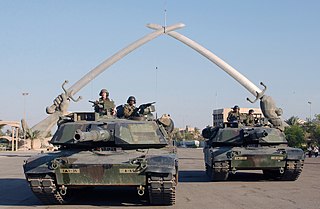
The following is a timeline of major events during the Iraq War, following the 2003 invasion of Iraq.
Events in the year 2005 in Iraq.

Tal Afar is a city in the Nineveh Governorate of northwestern Iraq, located 63 km (39 mi) west of Mosul, 52 km (32 mi) east of Sinjar and 200 km (120 mi) northwest of Kirkuk. Its local inhabitants are exclusively Turkmen.
The following lists events that happened during 2006 in Iraq.
Events in the year 2007 in Iraq.
The 2007 Kirkuk bombings were a series of three suicide and car bomb attacks that occurred on July 16, 2007, in the northern Iraqi oil city of Kirkuk. The bombing killed 86 people with up to 180 injured.

The Iraqi Kurdish Civil War was a civil war that took place between rival Kurdish factions in Iraqi Kurdistan during the mid-1990s, mostly between the Patriotic Union of Kurdistan and the Kurdistan Democratic Party. Over the course of the conflict, Kurdish factions from Iran and Turkey, as well as Iranian, Iraqi and Turkish forces, were drawn into the fighting, with additional involvement from American forces. Between 35,000 and 40,000 fighters and civilians were killed.
Events in the year 2009 in Iraq.
In 2003, there were 25 suicide bombings executed by 32 attackers.
The 20 June 2009 Taza bombing was an attack which took place in Taza near Kirkuk, Iraq on 20 June 2009 in a dominant Shia Turkmen community. At least 73 people were killed and over 200 more were injured. Thirty homes were destroyed in the bombing.
2006 in Iraq marked the onset of a sectarian war in Iraq and remains the deadliest year of the Iraq War since the 2003 invasion of Iraq.

This list details terrorist incidents occurring in Iraq in 2007. In 2007, the US sent 20,000 additional troops into combat as part of a troop surge. There were 442 bombings in 2007, the second-most in a single year during the Iraq War. Major events included a January 16 attack on Mustansiriyah University, which killed 70 and injured 180, and February 3 bombings at the Sadriyah market in Baghdad, which killed 135 people.
Events in the year 2010 in Iraq.

The Iraqi–Kurdish conflict consists of a series of wars, rebellions and disputes between the Kurds and the central authority of Iraq starting in the 20th century shortly after the defeat of the Ottoman Empire in World War I. Some put the marking point of the conflict beginning to the attempt by Mahmud Barzanji to establish an independent Kingdom of Kurdistan, while others relate to the conflict as only the post-1961 insurrection by the Barzanis.

The Iraqi insurgency was an insurgency that began in late 2011 after the end of the Iraq War and the withdrawal of U.S. troops from Iraq, resulting in violent conflict with the central government, as well as low-level sectarian violence among Iraq's religious groups.
The following lists events in 2012 in Iraq.
The following lists events that happened during 2014 in Iraq.
The following lists events the happened in 2013 in Iraq.
The 2005 Erbil bombing was a suicide attack on the offices of Kurdish political parties in Erbil, Kurdistan Region, on May 4, 2005. The attacker detonated explosives strapped to his body as people lined up outside a police recruiting center in Erbil. Ansar al-Sunna claimed responsibility. This attack is an example of religious terrorism, groups who commit terrorist acts because of religion believe that their deity or deities are on their side and that their violence is divinely inspired and approved. This attack is also an example of Strategic terrorism. Which is a form of terrorism where the terrorist plans to inflict mass casualties. The goals of Strategic terrorism are normally not local objectives but global objectives or regional objectives. Ansar al-Sunna's goal is to transform the country of Iraq into an Islamic state so their goals are regional.






